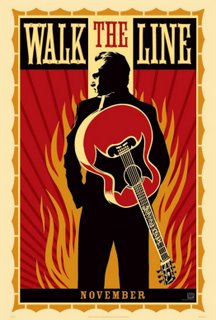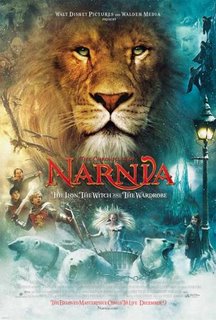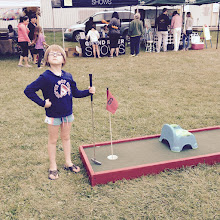Walk The Line

Last night, Dwayne and I, and a couple friends, went to see the opening of "Walk the Line" the new biopic on Johnny Cash. I had never paid much attention to Johnny Cash before marrying Dwayne, who is a big fan. We waited in line for 45 minutes before filing into a very packed theater.
My thoughts about the Johnny Cash movie revolve around two things, 1) the way the large group interacted with the screen, and 2) The way the movie portrayed Johnny and June. It was so fascinating to listen as the audience settled into the theater. There is a way in which many different bodies will function as one, when placed side by side. For example, before "Walk the Line" even began, the collective psyche of the audience formed during the previews.
If you have not already seen trailers for the new movie called "Brokeback Mountain" (the "gay cowboy" movie as it's been dubbed), you will soon. I initially saw this preview on Apple's movie trailer website, and from the first was riveted. I was taken for two reasons, 1) I believe this movie will be the first gay movie to appeal to a popular audience, and 2) more importantly, it stars Jake Gyllenhal and Heath Ledger as lovers. This alone is enough to send the senses reeling because both these guys are straight heartthrobs in the industry right now. Hear the millions of teenage hearts pounding.
The theatre was a buzz with anticipation for "Walk the Line." People were chattering and laughing completely oblivious of the previews, and the beginning of "Brokeback Mountain" was no different from the rest. In fact, it seemed a little hokey, with a sweeping orchestral soundtrack, wide shots of Heath riding horseback, Jake fishing, or the two of them chopping down trees.
The first time I saw the beginning of the trailer, I thought, "Oh, Mom would like this movie." But then suddenly in the middle of it all Jake and Heath are snuggling beneath a blanket, and then stripping off their clothes in the heat of passion. At this exact point in the trailer the collective psyche of the theatre snapped into place. Like a roar of the thunder, voices erupted across the seats. Men and women whooped in agony, groaned in pain. "Awh, not like that man!" "That's just wrong!" As the minutes moved toward the start of "Walk the Line" the audience relapsed back into their scattered conversations. There was a palpable buzz in the air. We were excited to be there. Excited to be with each other. Excited to see the movie, but just more excited to have something to be excited about.
Even as the movie began and the titles started appearing and vanishing on the black screen, voices were still going. Soon the collective conscience splintered. Some got irritated and across the vacuum whispered "shhhhhh" "shhhhhhh." But others were too high on their own energy to quit. Voices raised and yelled cat calls, mocked those who were trying to quiet them. "I'm about to kick some ass!" I heard one man yell from the right. But soon, as the music of "Folsom Prison Blues" charged out of the speakers and pulsed like a steady train, the crowd simmered then died to a quiet as Joaquin Phoenix appeared.
This brought me to my second observation: the power of people like Phoenix and Reese Witherspoon to command the attention of a crowded theater. That's why they’re famous. That's why they’re entertainers, because you could put anyone up on the screen, you could put me up on the screen, but I guarantee this face, this presence would not be enough to quiet a theatre full of jittery bodies, buzzed on their own excitement.
And as captivating as Phoenix and Witherspoon were they still, for me, did not manage to fully embody the magic that seemed to radiate from Johnny and June. I've never seen Cash and Carter perform. I've only heard their music and looked at pictures, and read articles but even these thin media are enough to translate some of the complexity and depth that made these people fascinating.
For example, in the Cash "Unearthed" collection Tom Petty talks a little about the chemistry and dynamic of June and Johnny. "June to me was the original rock 'n' roll gal - right until the end of her life. June was there [the studio] every day, unless she went out shopping or something, and she'd come in with fur boas and all sorts of ornate clothing and talk quite a bit, and you couldn't help but love her. John so depended on June."
Benmont Tench said about the two, "She would be sitting on the couch and she would talk and tell you stories about Elvis or anybody. She was such a delight... [Johnny] was kind of "The Man In Black" and she was this entirely different light and it was wonderful the way they fit together."
Until the movie, I didn't realize that June & Johnny had toured in the early days of Cash's career with Jerry Lee Lewis, Clark Perkins, and Elvis Priestley. Cash, Lewis, Priestley, and Perkins were known as the "Million Dollar Quartet" and it was during these early days that June and Johnny crashed into their deep attraction for one another. Both were married to different people at the time.
"Walk the Line" really ignited my interest in June Carter. While Reese Witherspoon did a great job channeling the sassy and strong Carter, she in no way captured what I imagine to be the enigma of June. This woman had so much personality and sparkle that even Elvis Priestley fell at her feet with love letters -- which Cash threw into a lake many years later.
I wake up this morning going back and forth about "Walk the Line." While it was completely enjoyable, it was sort of doomed from the start. The truth is, I want the truth. I don't just want to watch someone's interpretation of John and June's music, lives, and love. I want to see them in person. I want to meet them and watch them for myself, divining from their movements and mannerisms my own interpretation of their lives. I want to be a first hand observer not a second hand taker, but that is no fault of the movie.
I want to get closer to June and Johnny, but the irony is with every biography, with every new movie that comes out we only slap one more interpretation, one more layer over the truth about their lives. They are gone, and time is pushing us away from the human beings that mesmerized a generation of country and rock 'n' roll music. The first hand evidence of their existence lies with those who were lucky enough to see them in concert, the few who were even luckier to meet and know them in person. That is a privileged handful, who will eventually slip from the present and leave behind their interpretations for the future to reinterpret. In the end, all a good biopic can do is point me back to the real life people they depict. And that is why, the first thing I did when I got up this morning was to pull all the Cash collections and biographies off the shelf and read them cover to cover.



